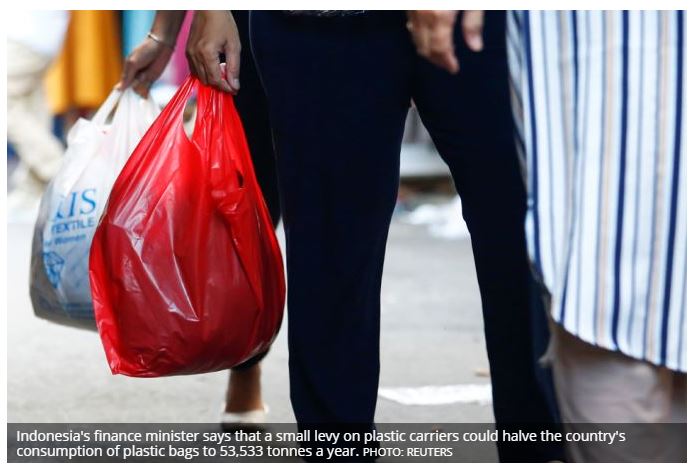Indonesian parliament wants to tax wider range of plastics
INDONESIA’S parliament on Wednesday told the government to tax a wider range of plastic products than it had proposed, but held off on the administration’s plans to levy sweet drinks and polluting vehicles.
The government had at first proposed to impose excise taxes on plastic bags, sweetened beverages and vehicles that emit carbon dioxide, to discourage their use, cut waste and reduce pollution in South-east Asia’s largest economy.
The government proposal came amid weak tax collection after the economy grew at its slowest pace in three years in 2019.
Indonesia had a nearly US$15 billion revenue shortfall last year due to weak company profits and falling exports.
Finance Minister Sri Mulyani Indrawati said after the parliamentary hearing that she would have to redesign her policy, as lawmakers’ approval was for duties on a wider range of products than originally asked for.
Ms Indrawati’s initial proposal was to impose an excise tax of 200 rupiah (S$0.20) per bag on plastic carriers, which she first submitted to parliament in 2017. Such a levy, though small, could halve Indonesia’s consumption of plastic bags to 53,533 tonnes a year, she said.
“We will consider all incoming aspirations because we don’t want to create more burden in the current weak economic conditions,” Ms Indrawati told reporters after the hearing.
Only China, according to a science journal report in 2015, dumps more plastic waste into the sea than Indonesia, an archipelago nation of 260 million people.
The Indonesian Olefin, Aromatic and Plastic Industry Association rejected parliament’s move, with its secretary general, Fajar Budiyono, suggesting that the government should apply duties only on imported plastic goods.
“It will be very difficult to apply excise on end products made of plastic . . . Too many small players,” Mr Budiyono said, adding that he predicted smuggling of plastic products would increase.
Ms Indrawati had also asked to levy taxes ranging from 1,500 rupiah to 2,500 rupiah per litre on sweetened beverages to control the rise of diabetes and obesity levels, which have steadily increased in Indonesia over the past decade. Some 2 per cent of Indonesians aged 15 and above suffered from diabetes in 2018, up from 1.1 per cent in 2007, while the number of obese adults rose from 10.5 per cent in 2007 to 21.8 per cent in 2018.
Another proposal was to impose duties on new vehicles that emit carbon dioxide as part of efforts to control pollution. Parliament wants the finance minister to provide further explanation of the plans to implement excise taxes on sweet drinks and vehicles, said Dito Ganinduto, chairman of parliament’s finance commission.
The total additional revenue expected from Ms Indrawati’s original proposal per fiscal year was 23.56 trillion rupiah. REUTERS


 Thailand
Thailand




